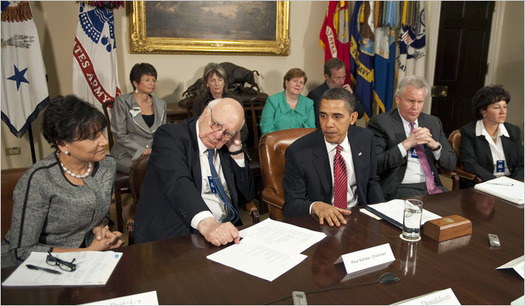MURDER, POLITICS, AND THE END OF THE JAZZ AGE
by Michael Wolraich

This photo shows Paul Volcker at the White House Economic Advisory Board, head in one hand, looking away from the President beside whom he is seated. He looks frustrated and dejected. He has a right to be.
Against the wall behind them sit Christina Romer and Larry Summers who looks like he is trying to suck an egg into his mouth through a hole in the top.
He served as Fed Chair from 1979-1987 under Carter and a time under Reagan, and apparently was effective at leading the nation out of some of the big crunches. Reagan fired him in 1987 and replaced him with Greenspan. He is the titular head of Obama's WHEAB, but has been reduced and sidelined to the point that he rarely comes to his office in D.C. any longer.
You will be able to guess why: He believes that regulation reform and oversight is going nowhere fast, and predicts that unless major changes are made in the way banking and Wall Street do business, the economy will likely crash again.
He apparently understands that the other advisors, including Austan Goolsbee, seem him as anachronism, a sentimental throw-back to Simpler Times. He would, no doubt, call them Saner Times. He wants Glsss-Steagall reinstated, or something akin to it, so that Commercial and Investment banking are heavily separated again. He wants the too-big-to fail banks broken up:
"The banks are there to serve the public," Mr. Volcker said, "and that is what they should concentrate on. These other activities create conflicts of interest. They create risks, and if you try to control the risks with supervision, that just creates friction and difficulties" and ultimately fails.
The only viable solution, in the Volcker view, is to break up the giants. JP Morgan would have to give up trading operations acquired from Bear Sterns. Bank of America and Merrill Lynch would go back to being separate companies. And Goldman Sachs could no longer be a bank holding company.
You probably already know that Goldman Sachs engaged in some might magic when, as an Investment Bank, it was permitted to become a holding company for Commercial Banking, therefore became eligible to receive FDIC coverage. Oy!
Joseph Stiglitz ,winner of a Nobel Prize in economics, agrees with Volcker, He was interviewed for this NY Times piece, and said that he agrees with Volcker, but knows that he is engaged in a Quixotic effort.
Even Alan Greenspan has called for the biggest banks to be made smaller, but certainly opposes re-instating anything like Glass-Steagall. Of course he would! Last night's Frontline described Greenspan as worshipping at the feet of Ayan Rand. There were interviews with Brooksley Born, head of the Commodity Futures Trading Board, who was an early alarm- sounder of credit default swaps. As we know, she was paid no heed. The Frontline is well worth watching.
As Fed Chair, Greenspan, appointed by Ronald Reagan of sainted memory, promoted de-regulation of banking as a cure-all for what ailed us. He must be proud that neither Congress nor the White House seems to want to do anything but tinker around the edges with reform even now. (Is there some keyboard combination that results in indicating "spitting" as you type someone's cursed name? No? Someone should invent one.) He said:
Taking issue implicitly with the Volcker proposal to split commercial and investment banking, he has said: "No form of economic organization can fully contain bouts of destructive speculative euphoria."
Translation? : So why even try???
The White House believes that their new regulations will fix it all, as do many other experts, and that the US needs big financial institutions to compete in the global market.
That contention seems to skirt the issue, though, doesn't it?
And meanwhile, while the White House continues to claim that Volcker has their ear, his advice and role have shrunk to a size that could fit on the head of a pin.
Mr. Volcker scoffs at the reports that he is losing clout. "I did not have influence to start with," he said.
The NY Times piece with the picture:
http://www.nytimes.com/2009/10/21/business/21volcker.html?_r=2&hp